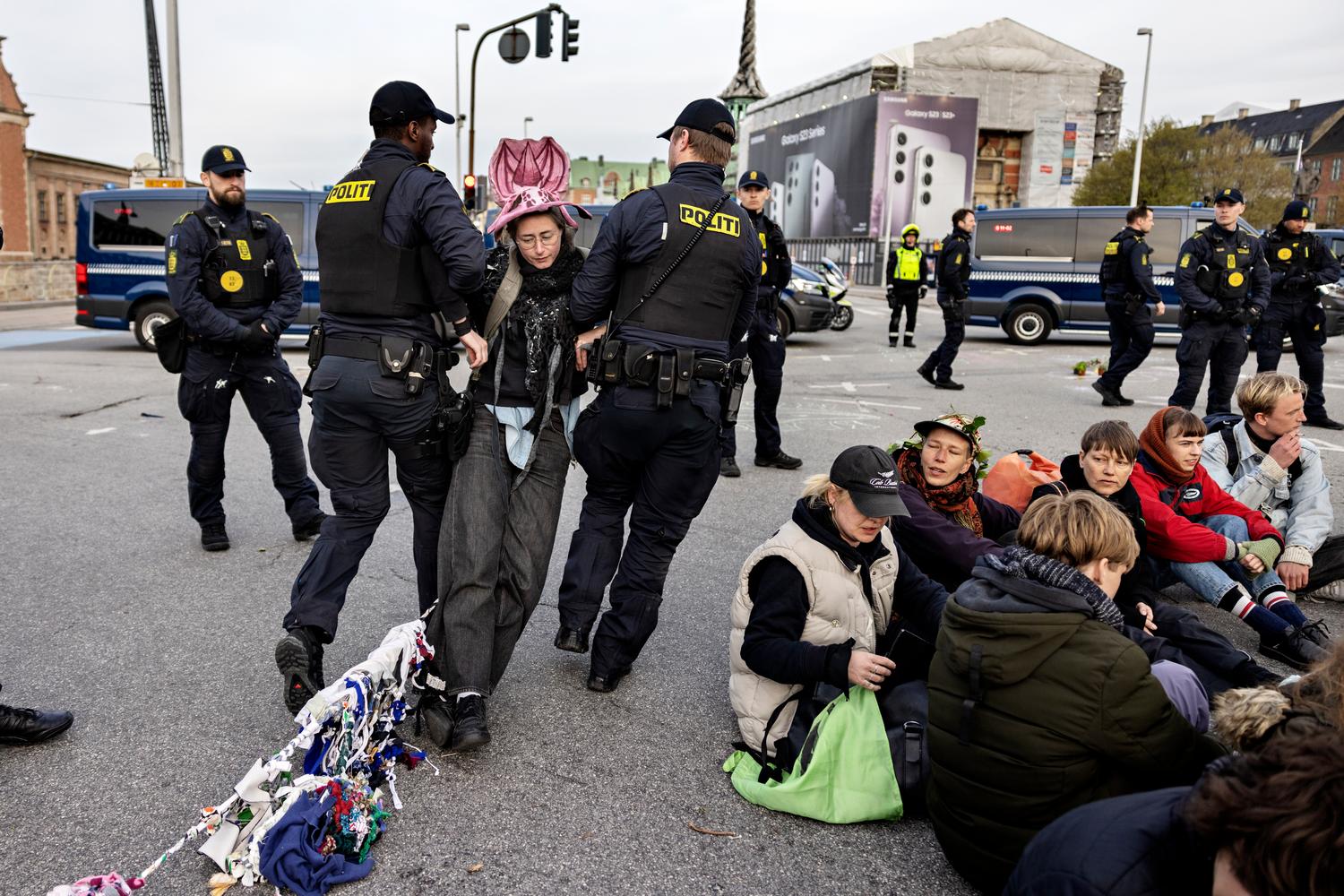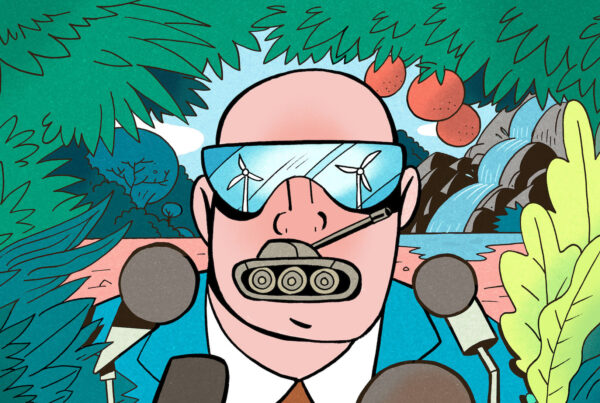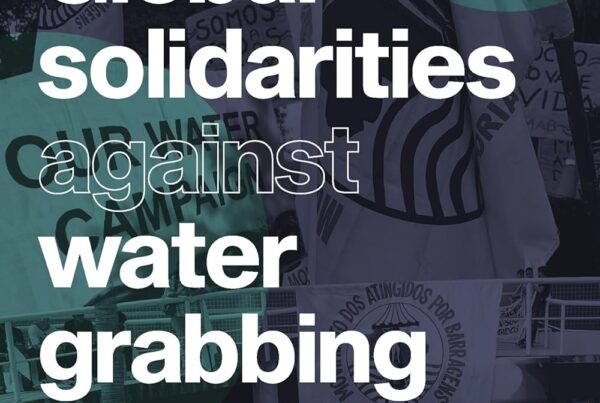By Salvatore Paolo De Rosa and Gustav Kruse
Civil disobedience for climate justice is on the rise in Europe, but so is the heavy hand of the police and the state against activists. In Denmark, the trend towards increasing policing and criminalization of climate activism is clearly visible, alongside incendiary rhetoric stigmatizing direct actions. This is a dangerous slope: we should realize that combating the criminalization of protest is an essential part of the fight for a habitable planet and a crucial component of defending democracy.
When it comes to climate ambition – the scope, fairness and speed of mitigation goals to ensure compliance with the Paris Agreement – Denmark has been hailed as a frontrunner. Despite such ambition, however, research shows that Denmark is falling short of its emissions reduction goals and equity commitments. And civil society is taking notice.
Since the 2019 so-called “climate election”, the country has seen a steady rise in social mobilizations for climate action and climate justice. Similarly to other European countries, in Denmark several groups as diverse as students, scientists, professional categories, pensioners and ordinary people, have taken to the streets in large numbers to demand real action. But besides the velvety rhetoric of the government, not much has happened in terms of the radical transformations required. Within civil society, some realized that demonstrations were not enough to awake Danish politicians to their responsibilities and the public to the need for swift action.
In recent years, the country, and especially Copenhagen, has been shaken, or rather disrupted, by the direct actions of climate activists employing nonviolent civil disobedience to spotlight the shortcomings, hypocrisies and insufficiencies of successive Danish governments in dealing with the climate crisis. And to call for bolder climate action.
At the same time these activists have been met with increasing police repression, harsher legal consequences, and belittling language, with the result that ways of protesting democratically are being gradually delegitimized, if not foreclosed. This is not just a Danish phenomenon: a recent comment in the journal Nature states that “governments seem more concerned with criminalizing non-violent protesters than acting on climate”, by enacting anti-protest legislation, more draconian sentencing and laws to curb protests. The same comment also mentions the growing evidence showing that “this wave of legislation is not driven by public opinion” and that “researchers need to explore what is driving this policy trend, including the actors involved and the role of the fossil-fuel lobby”.
Recent developments in Denmark provide indications that the country’s freedoms are on a slippery slope. The details of detentions are especially concerning, as well as the rhetoric that springs in the media alongside the reports of arrests. For instance, in May 2022, 238 climate activists were arrested for civil disobedience actions. One of the arrestees claimed he was denied a phone call, warm clothes and toilet use while detained. He was also called a criminal and told by the police he would face one and half years in prison. These same activists were singled out in Berlingske as fanatics and totalitarian. In October 2022, Søren Pape (C) told activists disrupting a televised party leader debate they were destroying democracy. Less than a year later, in May 2023, over one hundred activists were charged for disturbing the public order as they blocked car traffic on H. C. Andersen Boulevard in Copenhagen. Referring to the action, Climate Minister Lars Aagaard told Berlingske that the activists don’t understand what they’re asking for. After two months, in July, police officers forced their way in between activists on motorcycles and cars.
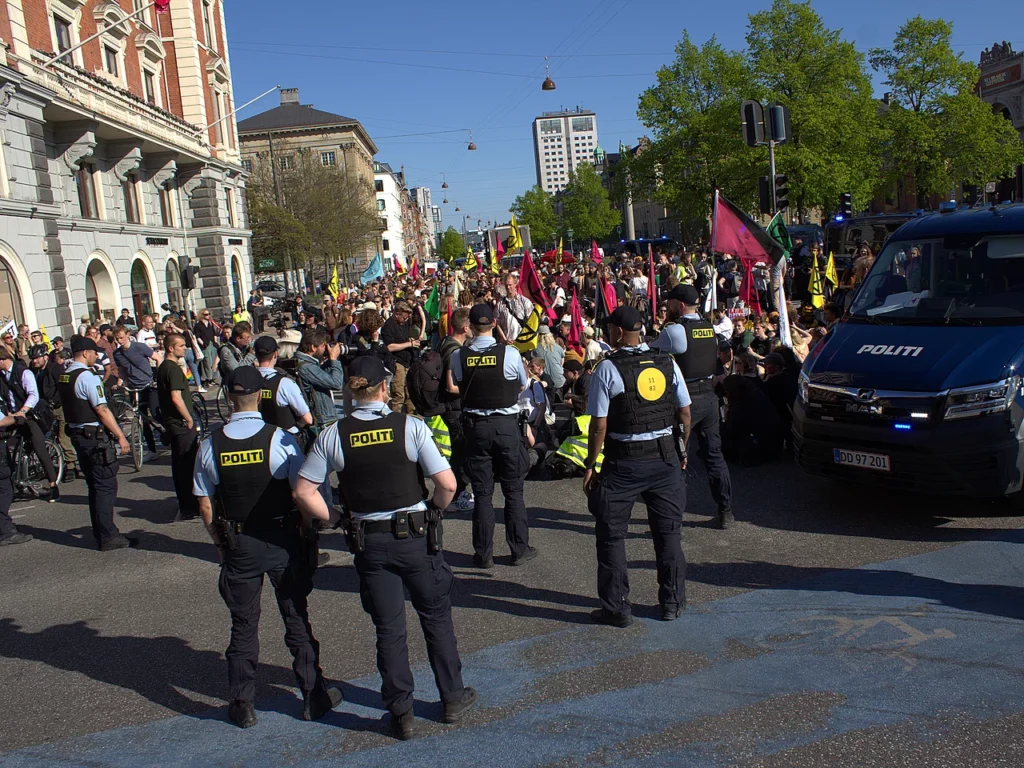
Over 100 people were charged following a road blockade organized by Extinction Rebellion on May 12, 2023 on H.C. Andersens Boulevard in Copenhagen. (source: Kosmopol)
Even though several political commentators stress that civil disobedience protests are un-Danish, historically this is not the case. Civil disobedience has been a key protest tactic ever since 1968, when activists in huge numbers took to the streets, built barricades, and squatted abandoned buildings. In the 2000s’ the landscape for activists changed as new anti-terror laws were introduced that criminalized certain aspects of disruptive actions. As such, Greenpeace was fined 30.000 kr in 2005, for hoisting a banner in Axelborg, the center for the Danish agricultural sector, against their use of gene modified feed for pigs. Greenpeace was charged as being a terrorist organization in Danish law because it engaged in civil disobedience actions.
The next jump in climate activists’ criminalization happened a month prior to the 2009 COP15 in Copenhagen, where the V and C government together with DF rushed a law giving more powers to the police through Folketinget. This increased the punishment for preventing the police’s work from a fine to forty days in prison; moreover, police detentions of activists became legal for up to twelve hours, the fines were greatly increased and the police could even arrest people in proximity of illegal protests. The government felt that disruptions of the public order should be dealt with swiftly and decisively. This is also reflected in the police’s newly acquired access to pepper spray since 2008, which significantly increased their capacity to contain protests.
During the COP15 the police used their newfound powers to arrest almost 2000 protesters, with 968 of them arrested during the same authorized protest. Many were forced to sit still on the ground for hours in the cold December as the police feared unrest. Several fainted or had to sit in their own urine as were denied toilet use. Only four people were actually charged with breaking the law, and in 2010 two of these were sentenced to three months in prison for throwing rocks. After the COP, the police were reprimanded by the supreme court for their violent and over the top handling of the protests.
A period of exhaustion in Danish climate politics and in the climate movement happened after the COP and it would not be until 2017-2019 that a new wave of climate activism started gaining popular support. Those years saw the first Folkets Klimamarch (People’s Climate March), the founding of Den Grønne Ungdomsbevægelse (The Green Youth Movement), the first Danish school strike by Fridays for Future and the first actions by the Danish branch of the non-violent civil disobedience group Extinction Rebellion (XR).
XR carried out their first Danish action in February 2019 in both Copenhagen and Aarhus, where they blocked trucks on their way to Aarhus oil harbor and hung up banners on Christiansborg. The police stopped the actions and took the activists’ identities. An activist from Copenhagen told Politiken that “the police will charge the activists with vandalism”. The activists legitimized their actions by stating that the politicians engaged in “political disobedience” by not honoring their climate commitments, therefore the activists felt compelled to engage in civil disobedience.
The following Extinction Rebellion action happened in April 2019. This was stopped by the police who identified the activists, carried out body searches and retained some of them. In June of the same year, XR blocked again the road to Aarhus oil harbor, which resulted in twenty-two arrests and charges for violation of the public order and for disobeying the police.
These rather harmless acts of civil disobedience were met with very different reactions by commentators and analysts. Some, such as Rune Lykkeberg saw them as necessary components of democracy, representing grassroots pressure from below. Of the opposite opinion were articles from Berlingske and Jyllands-Posten, which called the activists “dangerous to democracy, angry and fanatical”. Berlingske journalist Lars Henrik Aagaard wrote that the climate movement was an avalanche with “risk of anger spilling over.” The minister of climate and energy at the time Lars Christian Lilleholt (V) stated that civil disobedience was outside democratic participation, and in an opinion piece in Jyllands-Posten political commentator Per Nyholm called Greta Thunberg a “dictator in the making” and the climate movement “a fanatical medieval children’s crusade with climate terrorism just waiting to happen”.
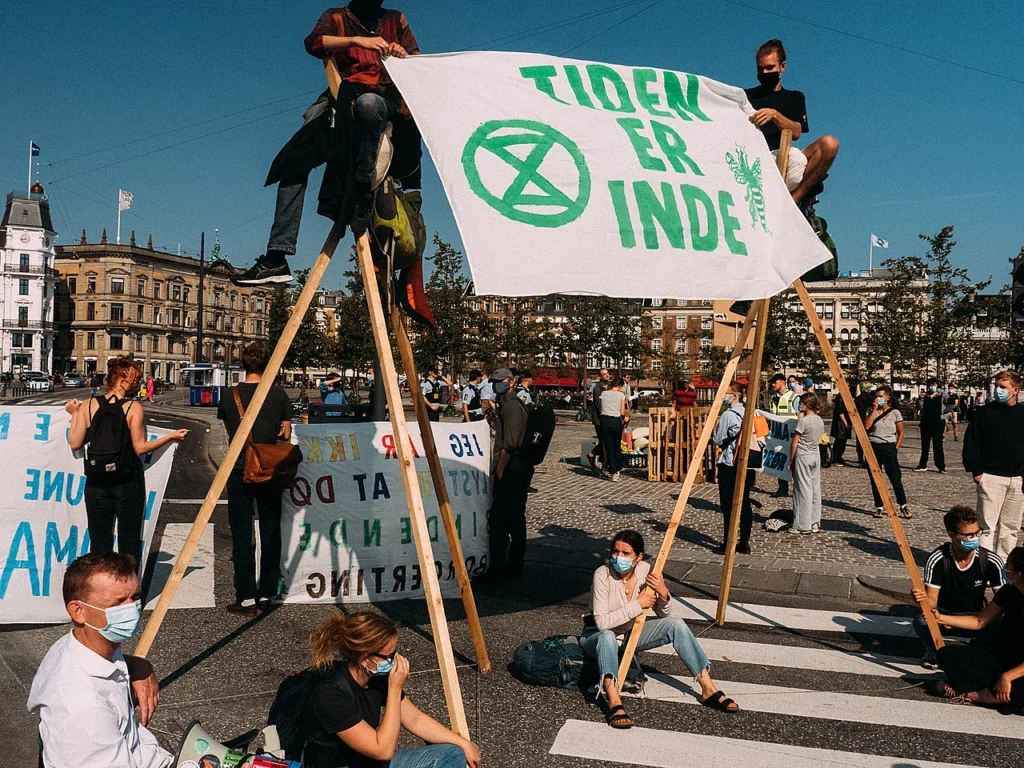
Climate activists block the main road at Kongens Nytorv in Copenhagen on September 16, 2020 (source: Kosmopol)
In 2020 activists of the group ‘Baltic Pipe Nej Tak’ occupied an expropriated house and broke into construction sites in southern Zealand to protest the construction of the Baltic Pipe gas pipeline. Following the action, the activists told Information that they feared police surveillance and that they received death threats. Some of these threats surfaced in the comment section in Ekstra Bladet: “Just drag them to the nearest forest. Tied at the back and down on the knees… and then… pop” and “Kill them, they are pests”.
In September 2020, as XR activists blocked car traffic on Kongens Nytorv by chaining themselves to a movable boat they brought in, the police charged and arrested them for breaking the traffic law and for disobeying the order to leave. As an officer forcibly put a black cloth over the face of a chained reporter, disguised as an activist, he told him “just look away. If we hit wrong, it won’t be a pretty sight. Do you know your blood type?”.
The harsh conduct of the police towards climate activists can also be seen in the Amager Fælled demonstrations, where several activists were arrested for blocking construction sites. Some activists climbed on a tree, which the police then threatened to cut down. An elderly female activist told Information in 2022 how the police pushed activists away from the building sites and how they threw her onto the ground.
This kind of treatment is also reflected in author Carsten Jensens’ experience of being arrested at an XR protest in 2022, after blocking a bridge and giving a speech. The police body searched him, told him he was a criminal, forced him to undress in a cold cell and denied giving him all his clothes back, denied him toilet use and said he would sit in prison for one and a half years. Eight months later, the charges were rejected as baseless. According to Jensen, the police’s conduct serves as a psychological intimidation technique to scare the climate movement.
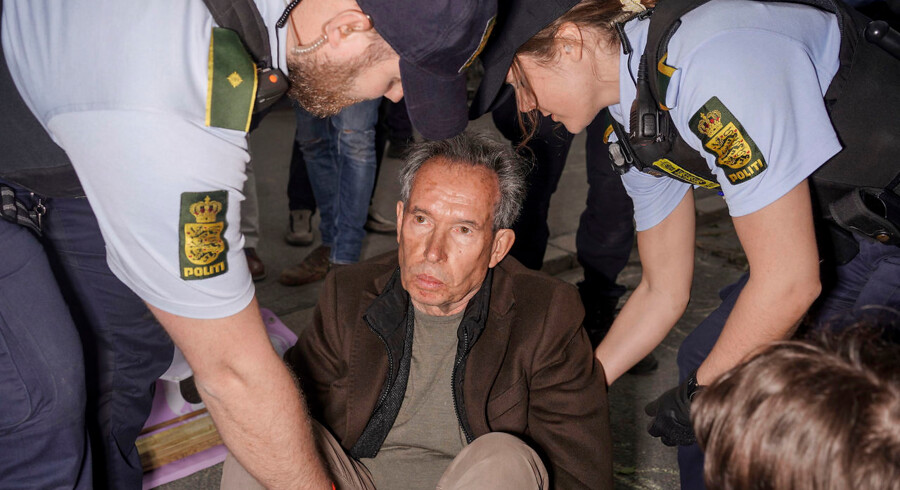
Leading Danish writer Carsten Jensen is arrested at an Extinction Rebellion protest on May 8, 2022, strip-searched by police, and told he risked 18 month jail sentence (source: Berlingske)
This is also why the police persistently tried to give two climate activist prison sentences for climbing onto a steel structure on Langebro back in May 2021 and blocking traffic. The activists were charged with the penal code 193, which states that:
“Anyone who unlawfully causes extensive disruption in the operation of ordinary means of transport, (…) is punished by a fine or imprisonment for up to 6 years.”
The activists were charged with blocking an important piece of infrastructure, but as the activists state, traffic was not blocked until the police arrived as they were the ones closing the road.
If you are found guilty of violating the criminal code, you will face harsher penalties, longer prison terms, and it will leave a mark on your criminal record. In earlier actions, activists were primarily charged with violating the Ordensbekendtgørelsen, or traffic laws, which are not included in the criminal code and only carry relatively small fines. Before the recent turn, the police tried to charge activists with violation of the criminal code 119 Stk. 4: blocking the police’s work, by for example chaining themselves to objects. XR claims that the police had hard times establishing if such a violation occurred. Consequently, in order to raise the stakes, the police arguably switched to criminal code 193.
However in 2021 when the two activists climbed on Langebro were arrested, the police were unsure of what to charge them with. As the activists told Solidaritet, both custody (varetægtsfængsling) and the anti-terror law were mentioned by the police while they were in detention. Back then, the police had not yet considered using penal code 193. In 2022 Byretten fined the two activists 2000kr each, but the police appealed based on section 193, and the case ended up in Østre Landsret in august 2023, with the activists risking a three month prison sentence. Since the same criminal code had been used to charge twenty-two more activists at this point, there was a chance that the case would set a precedent for jail terms. However, Landsretten upheld Byrettens judgment. Therefore, it appears that the application of section 193 of the penal code is more of a blatant attempt to criminalize and increase repression of nonviolent climate activists.

Climate activists from Extinction Rebellion climbed Langebro in central Copenhagen on November 26, 2021 to demonstrate against overconsumption on Black Friday (source: Press Photo DK)
Such antagonism towards climate activists shows a dangerous development in our democracy. By setting increasingly repressive barriers to the ways climate activists highlight the shortcomings of Danish climate politics, and in the process belittling them for trying, the government and the media attempt to prevent ways of protesting that, whether they like or not, fall within the scope of democracy. As such, the political momentum is geared towards securing the status quo by restricting freedom of speech and freedom of assembly, shrinking democratic spaces for dissent in the process.
Furthermore, public and political rhetoric make it seem like civil disobedience necessarily leads to radicalism and terrorism. However, it is the government inaction, and the lack of representation for those advocating for more ambitious climate action, that motivates activists to make use of new methods. Civil disobedience is increasing more as a result of a “closing window of opportunity”, as stated by the IPCC, to tackling the climate crisis and as a response to Denmark falling short in terms of fairness and equity commitments, rather than as a radicalization of activists themselves.
The backlash against activists shows a fear of dissenting voices in the current conjuncture. People who embody and voice other ways of living, an end to the extractivist economy and a new social structure are seen as dangerous and are labeled criminals. However, it is not the activists who are ‘radicals’, as they embody the scientific consensus and act on behalf of the entire society. The real radicals, as pointed out by UN secretary Antonio Guterres, are “those irresponsible governments, institutions and corporations whose actions are causing and will cause mass suffering”. But they are left undisturbed.
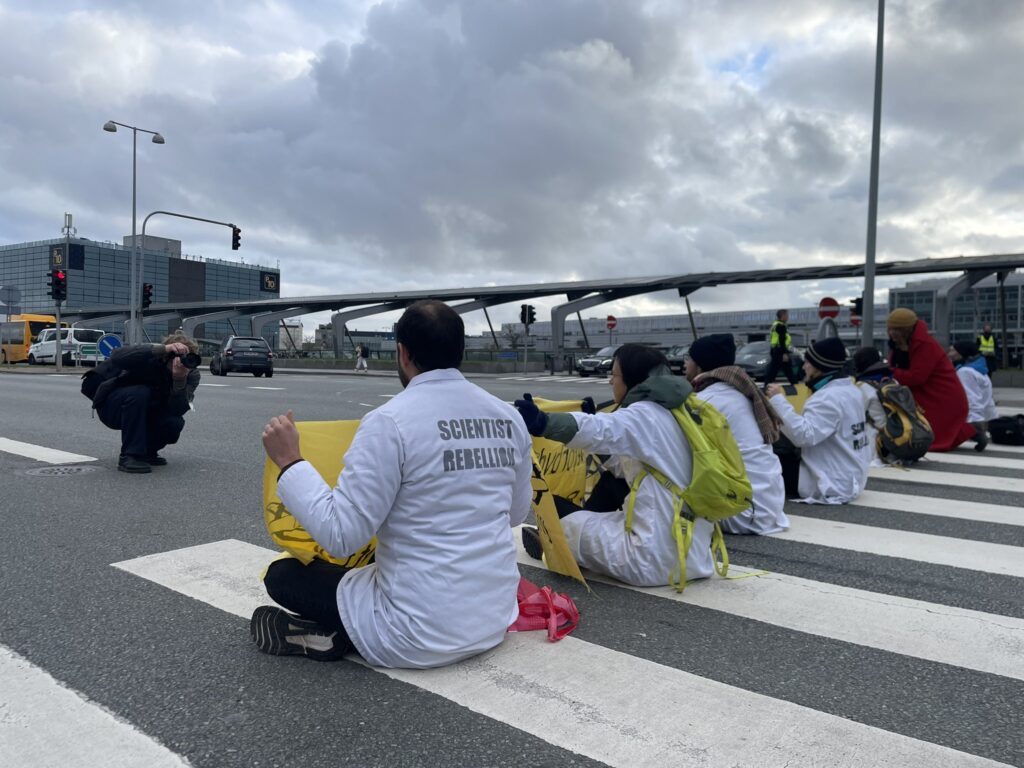
Climate activists including scientists blocked the main road in front of Copenhagen Airport on NOvember 11, 2023, to demand a ban of private jets and a stop to the airport expansion (source: Scientist Rebellion on X).
Moreover, as recently stated by Michel Forst, the UN Special Rapporteur on Environmental Defenders, after his first visit to the United Kingdom, where criminalization of dissent is rampant, “protests (…) are by their nature disruptive. The fact that they cause disruption or involve civil disobedience do not mean they are not peaceful. As the UN Human Rights Committee has made clear, States have a duty to facilitate the right to protest, and private entities and broader society may be expected to accept some level of disruption as a result of the exercise of this right”. He also adds: “By deriding environmental defenders, the media and political figures put them at risk of threats, abuse and even physical attack (…) This has a significant chilling effect on civil society and the exercise of fundamental freedoms”.
We should realize that combating the criminalization of protest is an essential part of the fight for a habitable planet and a crucial component of defending democracy. The way we call things matters. Calling something terrorism that is not terrorism, matters. Such misattributions prevent understanding and cements a discursive reality which Foucault would argue establishes a ‘regime of truth’, a dominant discourse that holds certain opinions as self-evident truths. Language does far more than describe; it establishes realities, and this cannot be underestimated.
Finally, history shows that when democratic protest is made impossible, there is a risk for some movements to go underground and escalate their tactics towards violence. The Danish government and the media, even if unwillingly, may be the ones summoning more violent responses with their reckless repression and criminalization of peaceful activists.
The original version of this article was published in Danish in the newspaper Politiken on March 11th, 2024 and is available here.


